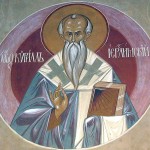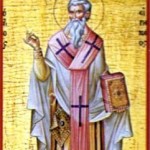Cyril of Jerusalem (ca. 313 – 386) “We were enemies of God by means of Sin; and God ordained that the sinner should die. Of two things, then, one must needs have happened; either that God should adhere to His word, and destroy all men, or that by giving scope to His benignity He should […]
Irenaeus on Christ
Irenaeus (c. 175-185 CE), quoted in a fragment of Timothy Aelurus (also exists in Syriac) ‘The Holy Scriptures recognize that Christ as He was Man, so likewise He was not man; and that as He was flesh, so also spirit, and Word of God, and God. And as in the last times born of Mary, […]
Orthodox Substitutionary Atonement
For I delivered to you first of all that which I also received: that Christ died for our sins according to the Scriptures, and that He was buried, and that He rose again the third day according to the Scriptures… (1 Cor. 15:3-4) No statement is more central to the Christian faith than what Paul […]
Basil on Baptism
Basil of Caesarea (also known as Basil the Great) (ca. 330 – 379 ) “For this cause the Lord, who gives us our life, gave us the covenant of Baptism, containing a type of life and death, for the water fulfills the image of death, and the Spirit gives us the promise of life. Hence […]



